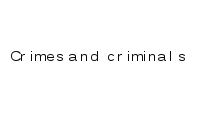- Преподавателю
- Иностранные языки
- Урок английского языка «Crimes and criminals»
Урок английского языка «Crimes and criminals»
| Раздел | Иностранные языки |
| Класс | - |
| Тип | Рабочие программы |
| Автор | Присяжнюк А.В. |
| Дата | 09.02.2014 |
| Формат | docx |
| Изображения | Есть |

РАЗРАБОТКА ОТКРЫТОГО УРОКА ПО АНГЛИЙСКОМУ ЯЗЫКУ
ТЕМА: " Crimes and criminals"
КЛАСС: 6-В

Разработала и провела учитель английского языка Присяжнюк А. В.
Тема урока: Crimes and Criminals.
Цель урока: Закрепление лексического материала по теме «Crimes and Criminals», развитие навыков разговорной речи, с опорой на аудиовизуальный материал.
Задачи урока:
Образовательные - закрепление лексического материала, получение новой информации.
Развивающие - развивать навыки говорения и прослушивания, анализировать и обобщать исследуемый материал.
Воспитательные - воспитать уважение к законам, самостоятельность, содействовать воспитанию творческого потенциала личности.
Дидактическая база урока- наглядный материал по лексике, диск.раздаточный материал.
Техническое оснащение урока- класс с интерактивной доской, проектор, ноутбуки, презентационная работа.
Тип урока - комбинированный урок.
Вид урока- урок-практикум.
Прогнозируемый результат.
Учащиеся умеют:
1.Использовать изученный на уроке вокабуляр.
2.Грамотно высказываться по тематике урока.
3.Анализировать, сравнивать, сопоставлять и самим определять степень и качество усвоенного материала.
The plan of the lesson:
1.Organization moment: ( 2 min)
- Good afternoon, children.
- Good afternoon, teacher.
- What date is it today?
- Today is the 18 th of April.
- What day is it today?
- Today is Thursday
-Today we are going to speak about crimes and criminals. What kinds of crimes do you know?
- burglary, vandalism, joyriding, drug dealing, murder, shoplifting, robbery, theft .
2. Matching: ( 3 min)
Look at the board, please. There are some crimes and pictures.Match the pictures with the crimes.
- the first picture is a burglary
- the second picture is a vandalism
- the third picture is a joyriding
- the fouth picture is a drug dealing
- the fifth picture is a shoplifting
- the sixth picture is a robbery
3. Fill in the table:( 5 min)
You know the names of the crimes, but how do we call the criminals, who commit these crimes? Let's fill in the table:
Verb
crime
criminal
to stealsomething
to burgle a house
to rob a bank
to shoplift something
to vandalise
something
to go joyriding
to sell
drugs
to murder someone
4.Matching .( 5 min)
( match the criminals with the actions they do) :
A shoplifter sells drugs
A burglar steal things from a shop without paying
A vandal breaks into the house to steal things
A murder breaks windows , telephone boxes
A thief steals cars
A drug dealer steals a lot of money from a bank
A joyrider steals something, that doesn't belong him
A robber kills people
5. Fill in the gaps Class CDRom ( 3 min)
( Now, let's do the task on your laptops. You have to fill in the gaps with the missing words)
Murder shoplifting vandalism stole drug dealers robbed burglar joyriders
-
Five men … the bank on Monday afternoon
-
…sell heroin at that disco
-
A man … my bag from me in the street
-
When he was young he went … at the shopping center
-
We arrived home and there was a … in our house
-
… usually steal and drives sport cars
-
Painting graffiti on walls isn't … . I think it is art
-
When people die in a war it's . . . not an accident.
6.Put the events in the right order: ( Work in groups) ( 5 min)
( I have two crimes , but the events aren't in the right order, put the events in the right order and name the crime)
1 ряд
They found the mone
They arrived at the house
They ran out of the house
The police arrived
They started looking for money
They took a car
The police arrested them
They ran out of the house
2 ряд .
There was a strange man.
Then he left quickly.
She was having lunch at the station
Jane travelled to London by train
Suddenly, he took Jane's bag from the table
The police arrested him.
Then he left
Jane phoned the police.
7. Playing the game" Who am I ? " ( 5 min)
( a card with the name of the criminal is put on the pupil's head. The pupil doesn't know who he is. He is trying to guess which criminal he is asking the questions)
- Do I steal cars?
- No, you don't
- Do I break the windows?
- No, you don't
- Do I break the houses?
- Yes, you do
- I am a burglar
- Yes, you are!
8. Listening: .( 3 min)
( We are going to listen to the dialogues, you have to choose the right answer . Which crimes are the people talking about?)
-
Burglary vandalism
-
Robbery shoplifting
-
Drug dealing theft
-
Robbery shoplifting
-
Joyriding theft
9. Making up the dialogues: ( Work in pairs) ( 5 min)
The pupils are given the cards with the words and phrases. Make up the dialogues " at the police station"
1 st card:
Can I help you?
an hour ago
steal a bag
Can you describe ?
a mobile phone, some money, some keys
fill in this form
2 nd card
How can I help you?
steal my car
Did you see anybody
how old?
teenagers
What colour?
as soon as
3 rd card:
a witness of a crime
didn't pay
Can you describe?
a red jacket, blue jeans
find and arrest
10. Acting out the dialogues. ( 5 min.)
10. Conclusion: ( 2 min.)
Today we have learnt a lot about crimes and criminals. How do you think which of these crimes is the most dangerous. Why?
-
I think the most dangerous crime is a . . . because …
12. Home task:( 2 min.)
Write an assay that will start with the words: The most dangerous crime is . . .
Thank you for the lesson. Goodbye , children.


